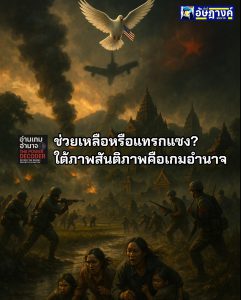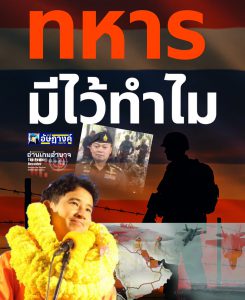
โดย อัษฎางค์ ยมนาค
Geopolitical Reality vs. Political Idealism
จุดจบของประเทศที่มีผู้นำเป็นลิ่วล้อชาติมหาอำนาจตะวันตก: กรณียูเครนและบทเรียนที่โลกต้องจดจำ ที่จะช่วยเปิดโลกทรรศ์ให้กับกองเชียร์พรรคสีส้มในประเทศไทยได้ตาสว่างกันเสียทีหรือยัง?
The Downfall of a Nation with a Western Puppet Leader: The Case of Ukraine and a Wake-Up Call for Thailand
การเมืองระหว่างประเทศไม่ได้ขับเคลื่อนด้วยอุดมการณ์เพียงอย่างเดียว แต่ยังขึ้นอยู่กับผลประโยชน์และอำนาจทางทหารที่แต่ละชาติสามารถรักษาไว้ได้ กรณีของยูเครนเป็นตัวอย่างที่ชัดเจนของประเทศที่ต้องเผชิญชะตากรรมอันโหดร้ายจากการพึ่งพามหาอำนาจตะวันตก โดยไม่มีศักยภาพเพียงพอในการรักษาอธิปไตยของตนเอง
สัญญาณของความพ่ายแพ้: ข้อตกลงที่อาจเกิดขึ้น
สงครามรัสเซีย-ยูเครนที่ดำเนินมาเป็นเวลากว่า 2 ปี ได้แสดงให้เห็นว่ายูเครนไม่สามารถเอาชนะรัสเซียได้ด้วยกำลังทหารเพียงอย่างเดียว แม้จะได้รับการสนับสนุนด้านอาวุธและเงินทุนจากตะวันตกอย่างมหาศาล ในขณะที่ความขัดแย้งยังดำเนินต่อไป สหรัฐฯ และพันธมิตรตะวันตกเริ่มพิจารณาทางออกที่ลดภาระของตน และอาจนำไปสู่ข้อตกลงสันติภาพที่ยูเครนต้องยอมรับ ซึ่งประกอบไปด้วย:
1. ห้ามยูเครนเข้าเป็นสมาชิก NATO – เพื่อรับรองว่ายูเครนจะไม่เป็นภัยคุกคามต่อรัสเซียในอนาคต
2. ห้ามยูเครนมีกองกำลังขนาดใหญ่ – ทำให้ยูเครนเป็น “รัฐกันชน” ที่ไม่มีศักยภาพทางทหาร
3. บีบให้มีการเลือกตั้งใหม่ – เพื่อนำรัฐบาลที่ “เป็นมิตร” กับรัสเซียเข้ามามีอำนาจ
4. ยูเครนต้องเสียดินแดนบางส่วน – ซึ่งรวมถึงไครเมียและ 4 แคว้นที่รัสเซียยึดครอง
5. รับรองว่าไครเมียเป็นของรัสเซีย – ตอกย้ำชัยชนะของมอสโก
6. ให้ 4 แคว้นทางตะวันออกของยูเครนแยกตัวไปเป็นส่วนหนึ่งของรัสเซีย
7. ตรวจสอบเงินช่วยเหลือของสหรัฐฯ – เพื่อยืนยันว่าถูกใช้ไปตามวัตถุประสงค์
8. ยูเครนต้องใช้หนี้ให้สหรัฐฯ ด้วยทรัพยากรแร่หายากและน้ำมัน – ทำให้ยูเครนกลายเป็นแหล่งทรัพยากรของมหาอำนาจตะวันตก
9. สหรัฐฯ พร้อมฟื้นฟูความสัมพันธ์กับรัสเซีย – เพื่อปรับสมดุลเชิงยุทธศาสตร์ โดยอาจมุ่งความสนใจไปที่จีนแทน
บทเรียนสำหรับประเทศอื่น ๆ
1. ประเทศเล็กต้องรักษาสมดุลอำนาจ – ไม่ควรพึ่งพามหาอำนาจฝ่ายใดฝ่ายหนึ่งโดยสิ้นเชิง
2. อำนาจอธิปไตยขึ้นอยู่กับกำลังทางทหารและเศรษฐกิจ – หากไม่มีการพึ่งพาตนเอง ประเทศอาจถูกบีบบังคับให้ยอมจำนน
3. การทูตสำคัญกว่าการทำสงคราม – การวางนโยบายต่างประเทศที่รอบคอบสามารถป้องกันสงครามและรักษาผลประโยชน์ของชาติได้ดีกว่า
4. มหาอำนาจไม่เคยช่วยใครฟรี ๆ – ยูเครนเป็นตัวอย่างที่ชัดเจนของประเทศที่ถูกใช้เป็นเครื่องมือทางภูมิรัฐศาสตร์
สุดท้าย: กองทัพมีไว้ทำไม?
คำกล่าวที่ว่า “ทหารมีไว้ทำไม รบไปก็ไม่ชนะ” และ “ไม่ต้องมีกองทัพ ถ้าผู้นำฉลาดพอ” อาจฟังดูเป็นอุดมคติ แต่กรณียูเครนพิสูจน์แล้วว่า หากไม่มีศักยภาพทางทหารที่แข็งแกร่ง ประเทศอาจถูกบังคับให้ยอมแพ้โดยไม่มีทางเลือก
สงครามยูเครนไม่เพียงแต่เปลี่ยนแปลงโฉมหน้าของยุโรปตะวันออก แต่ยังเป็นบทเรียนสำคัญสำหรับทุกประเทศที่คิดว่าการพึ่งพามหาอำนาจคือหนทางสู่ความมั่นคง การรักษาอำนาจอธิปไตยต้องอาศัยทั้งความสามารถทางการทูตและการป้องกันประเทศ ไม่ใช่การฝากอนาคตไว้กับผู้อื่น
วาทกรรม “ไม่ต้องมีกองทัพ ถ้าผู้นำฉลาดพอ” กับความเป็นจริงทางภูมิรัฐศาสตร์
คำพูดของ พิธา ลิ้มเจริญรัตน์ อดีตหัวหน้าพรรคก้าวไกลที่ว่า
“ทหารมีไว้ทำไม รบไปก็ไม่ชนะ”
“ไม่ต้องมีกองทัพด้วยซ้ำไป ถ้าผู้นำฉลาดพอ”
สะท้อนถึงแนวคิดที่มองว่าการทูตและการบริหารเชิงนโยบายมีความสำคัญกว่าการพึ่งพากำลังทหาร แต่หากนำแนวคิดนี้ไปเปรียบเทียบกับกรณียูเครน จะเห็นว่าความจริงทางภูมิรัฐศาสตร์ไม่ได้เป็นไปตามอุดมคติที่คำพูดนี้พยายามสื่อ
1. บทเรียนจากยูเครน: เมื่อไม่มีศักยภาพทางทหาร ก็ไม่มีอำนาจต่อรอง
ยูเครนพยายามใช้การทูตกับชาติตะวันตกเพื่อสร้างหลักประกันความมั่นคงให้กับตนเอง แต่ในท้ายที่สุด กลับต้องตกอยู่ในสถานการณ์ที่ถูกใช้เป็นเครื่องมือของมหาอำนาจ
• หาก ยูเครนไม่มีทหารเลยตั้งแต่ต้น ตามแนวคิด “ไม่ต้องมีกองทัพ” ยูเครนจะ ถูกยึดครองโดยรัสเซียไปตั้งแต่ปี 2014 โดยไม่มีโอกาสต่อรองแม้แต่น้อย
• แม้จะมีกองทัพ แต่ขาดอำนาจเชิงยุทธศาสตร์ ยูเครนยังคงพ่ายแพ้ เพราะระบบการเมืองของประเทศไม่ได้วางยุทธศาสตร์ป้องกันชาติให้สอดคล้องกับความเป็นจริง
• มหาอำนาจไม่เคยช่วยเหลือใครฟรี สุดท้ายยูเครนกลายเป็นรัฐหนี้สินที่ต้องจ่ายคืนสหรัฐฯ ด้วยทรัพยากรของชาติ
→ กรณียูเครนพิสูจน์แล้วว่า การไม่มีศักยภาพทางทหาร ไม่ได้หมายความว่าประเทศจะรอดพ้นจากสงคราม ตรงกันข้าม อาจทำให้ประเทศตกเป็นเหยื่อของสงครามได้ง่ายขึ้น
2. หากไทยไม่มีทหาร จะเกิดอะไรขึ้น?
การใช้แนวคิด “ไม่ต้องมีกองทัพ” มาใช้กับประเทศไทยโดยไม่วิเคราะห์บริบทของประเทศ อาจนำไปสู่ ภัยคุกคามที่ร้ายแรงกว่าที่หลายคนคิด
• ภัยจากมหาอำนาจในภูมิภาค
• ไทยตั้งอยู่ท่ามกลางประเทศที่มีกองทัพแข็งแกร่ง เช่น จีน, เวียดนาม, อินโดนีเซีย และเมียนมา
• หากไทยไม่มีทหาร จะกลายเป็นเป้าหมายที่อ่อนแอ และอาจถูกกดดันทางยุทธศาสตร์
• ปัญหาความขัดแย้งชายแดน
• ไทยมีข้อพิพาทเรื่องดินแดนกับเพื่อนบ้าน เช่น กัมพูชาและมาเลเซีย
• หากไม่มีทหาร ความขัดแย้งเหล่านี้อาจถูกตัดสินโดยอำนาจของประเทศที่มีกองทัพแข็งแกร่งกว่า
• ปัญหาความมั่นคงภายใน
• ปัญหาชายแดนภาคใต้และภัยจากอาชญากรรมข้ามชาติจำเป็นต้องมีกองกำลังทหารและความมั่นคง
• หากไม่มีทหาร ไทยอาจเผชิญกับภัยคุกคามภายในที่ยากจะควบคุม
→ ดังนั้น แนวคิด “ไม่ต้องมีกองทัพ” เป็นอุดมคติที่อาจใช้ได้ในบางประเทศที่มีหลักประกันความมั่นคงจากชาติพันธมิตร เช่น ญี่ปุ่น (ที่ได้รับการคุ้มครองจากสหรัฐฯ) แต่ไม่สามารถใช้ได้กับประเทศไทยที่ต้องพึ่งพาตัวเอง
3. คำเปรียบเทียบของ ดร.เจษฎา: “พิธาเก่งเหมือนผู้นำยูเครน” กับความจริงที่แตกต่าง
ดร.เจษฎา เคยกล่าวชื่นชม พิธา โดยเปรียบเทียบว่าเก่งเหมือน โวโลดีมีร์ เซเลนสกี ผู้นำยูเครน ซึ่งอาจมีนัยยะว่าเป็นผู้นำที่กล้าหาญ ท้าทายมหาอำนาจ และมีความสามารถในการต่อสู้ทางการเมือง
อย่างไรก็ตาม เมื่อพิจารณาจาก ผลลัพธ์ของการบริหารประเทศของเซเลนสกี ในปัจจุบัน คำชมนี้อาจไม่ได้เป็นข้อดี แต่กลับกลายเป็น สัญญาณเตือนสำหรับไทย
• เซเลนสกีนำพายูเครนเข้าสู่สงครามที่ทำให้ประเทศพังพินาศ
• ตัดสินใจพึ่งพาตะวันตกโดยไม่วิเคราะห์ความเป็นไปได้ของชัยชนะ
• ไม่สามารถรักษาอำนาจอธิปไตยของประเทศไว้ได้
• ทำให้ยูเครนต้องยอมรับเงื่อนไขที่เลวร้าย เช่น การเสียดินแดนและต้องจ่ายหนี้ด้วยทรัพยากรของชาติ
• หากพิธานำไทยไปในแนวทางเดียวกัน ไทยอาจตกอยู่ในสถานะเดียวกับยูเครน
• หากใช้แนวคิด “ไม่ต้องมีกองทัพ” อาจทำให้ไทยสูญเสียความสามารถในการป้องกันตนเอง
• การพึ่งพาตะวันตกหรือมหาอำนาจโดยไม่มียุทธศาสตร์ของตัวเอง อาจทำให้ไทยต้องยอมรับเงื่อนไขที่เสียเปรียบ
→ คำชมของ ดร.เจษฎา อาจฟังดูดีในมุมมองของผู้สนับสนุน แต่ในเชิงภูมิรัฐศาสตร์แล้ว การเปรียบเทียบนี้เป็นเครื่องเตือนใจว่าหากไทยมีผู้นำที่บริหารแบบเซเลนสกี ประเทศอาจต้องเผชิญหายนะเช่นเดียวกับยูเครน
สรุป: อุดมคติกับความเป็นจริง
1. แนวคิด “ไม่ต้องมีกองทัพ” อาจใช้ได้ในบางบริบท แต่ไม่สามารถใช้ได้กับไทย
• ไทยต้องเผชิญกับภัยคุกคามภายนอกและภายใน
• การมีกองทัพเป็นเครื่องมือทางยุทธศาสตร์ในการรักษาอธิปไตย
2. กรณียูเครนพิสูจน์แล้วว่า ประเทศที่ขาดศักยภาพทางทหาร ไม่สามารถรักษาอธิปไตยของตนเองได้
• ยูเครนต้องยอมรับเงื่อนไขที่เสียเปรียบ เพราะไม่มีอำนาจต่อรอง3. การเปรียบเทียบพิธากับเซเลนสกี อาจเป็นสัญญาณเตือนมากกว่าการชื่นชม
• เซเลนสกีทำให้ยูเครนพังพินาศ การเปรียบเทียบนี้อาจสะท้อนถึงแนวทางที่อันตรายสำหรับไทย
→ ดังนั้น การเมืองต้องตั้งอยู่บนพื้นฐานของความเป็นจริง ไม่ใช่อุดมคติที่อาจนำพาประเทศไปสู่หายนะ
The Downfall of a Nation with a Western Puppet Leader: The Case of Ukraine and a Wake-Up Call for Thailand
Geopolitical Reality vs. Political Idealism
International politics is not driven solely by ideology but by national interests and military power. Ukraine serves as a stark example of a country that has suffered a tragic fate due to its reliance on Western powers without having sufficient military and economic strength to uphold its sovereignty.
The Signs of Defeat: A Peace Agreement on the Horizon?
The Russia-Ukraine war, ongoing for over two years, has demonstrated that Ukraine cannot defeat Russia through military means alone, despite massive Western support in terms of weapons and financial aid. As the conflict drags on, the U.S. and its allies are reconsidering their commitments and seeking an exit strategy that reduces their burden. This could lead to a peace deal that Ukraine may be forced to accept, likely including the following terms:
1. Ukraine is barred from joining NATO – to ensure it no longer poses a threat to Russia.
2. Ukraine must downsize its military – turning it into a buffer state with minimal military capability.
3. Ukraine must hold new elections – potentially replacing the current government with one more “Russia-friendly.”
4. Ukraine must cede territory – including Crimea and four eastern regions occupied by Russia.
5. Recognition of Crimea as part of Russia – cementing Moscow’s strategic victory.
6. The four breakaway regions officially join Russia – reinforcing Russia’s territorial gains.
7. U.S. aid to Ukraine must be audited – ensuring funds were used appropriately.
8. Ukraine must repay its debts to the U.S. with rare minerals and oil – effectively turning Ukraine into an economic resource for Western powers.
9. The U.S. seeks to restore relations with Russia – likely shifting its strategic focus toward China.
Lessons for Other Countries
1. Small nations must maintain a balance of power – relying entirely on one major power is a dangerous gamble.
2. Sovereignty depends on military and economic strength – without self-reliance, a country can be forced into submission.
3. Diplomacy is more effective than war – strategic foreign policy can prevent conflicts and safeguard national interests.
4. Superpowers never offer free help – Ukraine has become a prime example of a country used as a geopolitical pawn.
Finally: Why Do Countries Need a Military?
The statement:
“Why have a military if you can’t win wars?”
“You don’t even need an army if the leader is smart enough.”
These words, spoken by Pita Limjaroenrat, former leader of the Move Forward Party in Thailand, reflect an idealistic belief that diplomacy and governance can override military necessity. However, Ukraine’s case proves otherwise.
• If Ukraine had no army from the start, as per the logic of “no need for a military,” Russia would have completely occupied Ukraine in 2014 with no resistance.
• Even with an army, Ukraine lacked strategic depth and suffered due to its over-reliance on Western support without securing its own defense.
• Superpowers never assist without conditions – Ukraine has become a debtor state, forced to repay with national resources.
→ Ukraine’s downfall proves that lacking military capability does not ensure peace; rather, it makes a country an easy target for external forces.
What If Thailand Had No Military?
Applying the “no military” doctrine to Thailand without considering geopolitical realities could lead to severe consequences:
• Threats from regional powers
• Thailand is surrounded by strong militaries, including China, Vietnam, Indonesia, and Myanmar.
• Without a military, Thailand would become a vulnerable target and subject to geopolitical pressure.
• Border disputes and territorial integrity
• Thailand has historical land disputes with Cambodia and Malaysia.
• Without an army, such conflicts would be resolved by the stronger military force of neighboring countries.
• Internal security concerns
• Issues such as the Southern insurgency and transnational crime require military presence for stability.
• Without armed forces, Thailand could face uncontrollable domestic security threats.
→ The “no military” idea is only viable for nations with security guarantees from powerful allies (e.g., Japan under U.S. protection). However, Thailand must rely on itself.
Dr. Jesada’s Comparison: “Pita is as brilliant as Ukraine’s Zelensky” – A Warning, Not a Compliment
Dr. Jesada once praised Pita Limjaroenrat, comparing him to Volodymyr Zelensky, the Ukrainian leader, implying that he is a bold and capable politician. However, considering Zelensky’s track record, this comparison might be more of a warning than a compliment.
• Zelensky led Ukraine into a devastating war
• He depended entirely on the West without evaluating the feasibility of victory.
• He failed to secure Ukraine’s sovereignty, leading to territorial losses and national destruction.
• Ukraine is now forced to accept severe conditions, including territorial concessions and economic subjugation.
• If Pita followed the same path, Thailand could suffer a similar fate
• Promoting the “no military” idea could weaken Thailand’s ability to defend itself.
• Over-reliance on Western powers could lead Thailand into a strategic trap, forcing it to accept unfavorable terms.
→ While some may see this as praise, the reality suggests that following Zelensky’s approach could lead Thailand toward national disaster.
Conclusion: Idealism vs. Reality
1. The “no military” doctrine is impractical for Thailand
• Thailand faces both external and internal security threats.
• The military is essential as a strategic tool for national defense.
2. Ukraine proves that nations without strong military forces lose sovereignty
• Ukraine is now in a weakened state, forced to accept defeat on Russia’s terms.
3. Comparing Pita to Zelensky should serve as a warning, not admiration
• Zelensky’s leadership has led Ukraine to destruction, territorial loss, and economic collapse.
• If Thailand follows the same path, it may face similar geopolitical disasters.
→ In geopolitics, decisions must be based on reality, not idealistic rhetoric that could lead a nation into irreversible decline.



